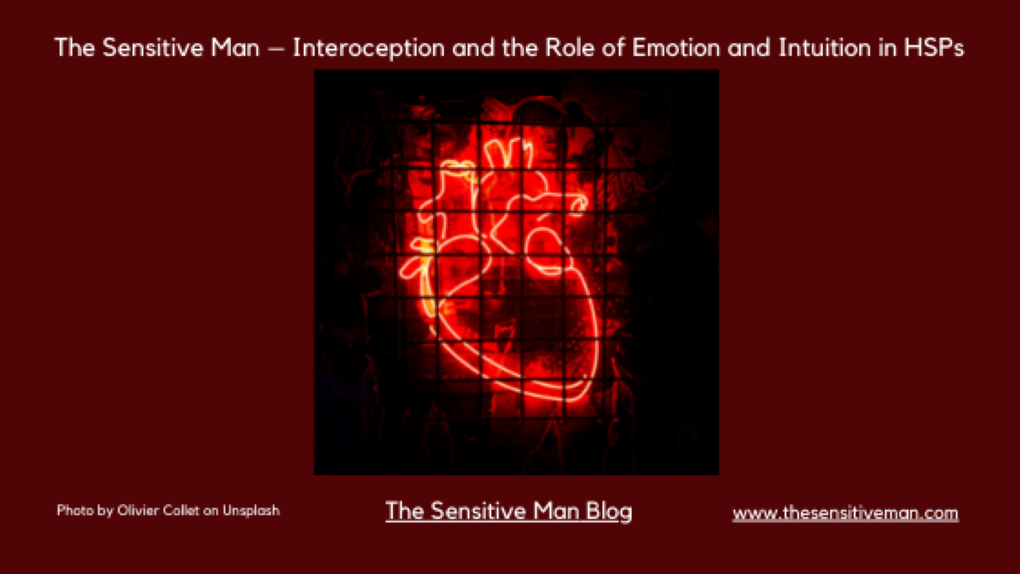|
A Blog about Sensory Processing Sensitivity from the Worldview of a High Sensing Male
Where is the seat of intuition and emotion? The body/mind has a mechanism to provide communication between the major visceral organ systems and the brain to give an internal sensory feedback loop. This process is called interoception. We are all familiar with environmental feedback via our sensory organs, where we interface with the external world. This is called enteroception. As HSPs, we process a good bit of this data, perhaps, more so than most people do. We also receive internally facing data from our body that provides an enormous amount of information about our internal health. Much of this information occurs below conscious awareness and provides the basis of emotion and intuition. Our ability to acknowledge this information is key to our overall health and wellbeing. What is Interoception? Interoception is all the signals from our internal organs that provide status information to the brain. It is a constant stream of information traveling mostly below our conscious awareness that provides feedback information to the right anterior insula of the brain, which also aids in the awareness of body states. This information stream is the seat of all emotion. These somatic markers occur before you are even aware of the emotion, and via interoception, help shape the feelings and subsequent behaviors that follow. Interoception supports our ‘gut’ feelings which is the main contributor of what we call intuition. These bodily signals flashing at neural speed help us provide quick feedback, particularly when reaction speed is necessary. The interoceptive systems are instrumental in helping form the sense of self and contribute to the personality formation of an individual. Is Interoception on a Spectrum? Not all people test at the same levels of body awareness. Some may be impeded by brain damage or even trauma. This is correlated with their ability to recognize and regulate their emotions. In depressed individuals, their lack of interoceptive perception contributes to their feelings of emotional numbness. In addition, the use of some drugs, medical and recreational, provides a mask to body awareness and can block some interoceptive signals. The ability to translate these impulses from the body into conscious awareness and be mindful of them is different across individuals. This ability can be measured, and there are distinctions, such as High Interoceptive Sensitivity (IS), which would lead us to believe that, much like environmental sensitivity, there is a range of IS natively that falls along a spectrum. Nevertheless, IS can be a skill that is learned via practice. Usage of techniques such as mindfulness can aid individuals in becoming more aware of the interoceptive signals and control responses such as levels of anxiety. This training would be useful in teaching emotional regulation, especially to individuals prone to high anxiety and depression. Studies show people who are better able to detect these internal bodily signals tend to be more emotional and experience emotions with greater intensity. Therefore, being more aware of these body signals can lead to anxiousness and even depressive episodes in some individuals. Development of Therapies How can one improve the awareness of such signaling to be more aware of our internal body state? There are many techniques to help turn our attention inward. I have spoken about these in other blogs. Principally, the mindfulness techniques that focus our conscious awareness on our emotions and feelings. By turning inward to experience the emotion/feeling, we can begin to refocus our attention on calming and self-soothing in a helpful and healthful way. Yoga, Tai Chi, meditation, Mindful Awareness in Body-oriented Therapy (MABT) , and brain training are excellent ways to become more aware of our internal systems. Ultimately, this leads to fuller engagement in life as our awareness becomes keener, and instead of letting emotions run us, we learn to regulate our feelings for greater overall health. Types of biofeedback, such as neurofeedback or Heart Math, heart rate variability monitoring, can give immediate feedback to help us learn to control these signals by using our conscious awareness. These therapies help improve our mental health by demonstrating a sense of control of things that we would have thought could not be controlled before training. Interoception and HSPs Since HSPs tend to be more intuitive, expressing more emotional intensity and feeling more empathy, can we consider HSPs higher in interoceptive sensitivity? Additionally, HSPs tend to be more anxious and depressed; both positively correlate with higher IS. It would seem that HSPs would be prime candidates, based on our temperamental makeup, to be likely higher in interoceptive sensitivity. Having all of those internal signals firing and our unique awareness of these bodily sensations would easily contribute to overload. Perhaps, this is one of the main reasons we experience such strong emotions and are prone to overwhelm. Learning to become aware of these signals and how to control a relaxation response would certainly help HSPs in their emotional regulation. Whether used in therapy or just incorporated into a daily practice of identifying then relaxing or releasing, these techniques could help aid in heading off overwhelm. This skillset could be another valuable tool in the HSP toolbelt. Again, this highlights the vital link between mind and body and the importance of awareness in controlling runaway emotions often unconsciously triggered by bodily functions. To be sure, more research is needed, but HSPs would be excellent test subjects. Please comment with your thoughts.
0 Comments
Leave a Reply. |
AuthorBill Allen currently lives in Bend, Oregon. He is a certified hypnotist and brain training coach at BrainPilots.com. He believes that male sensitivity is not so rare, but it can be confounding for most males living in a culture of masculine insensitivity which teaches boys and men to disconnect from their feelings and emotions. His intent is to use this blog to chronicle his personal journey and share with others. Archives
July 2024
Categories
All
|


 RSS Feed
RSS Feed
